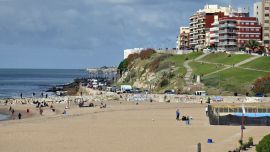A surge in violent crime looks set to dominate presidential elections Sunday in Chile, where the far-right is riding high with promises to crack down on transnational gangs and carry out mass migrant deportations.
A sharp increase in murders, kidnappings and drug-trafficking over the past decade has sown terror in one of Latin America's safest nations, causing a right-ward lurch after nearly four years of centre-left rule.
"What I want from the next president is more of an iron fist," or 'mano dura' in Spanish, said Hernán González, a 28-year-old educator for juvenile offenders in the northern city of Iquique, accusing migrant "hordes" of driving "trafficking, crime and juvenile drug use."
The main left-wing candidate, Jeannette Jara, is a communist, who is leading polls for the first round, ahead of far-right candidate José Antonio Kast, the runner-up four years ago.
But 51-year-old Jara faces an uphill battle to overcome strong resistance to communism in one of Latin America's most pro-business economies.
Polls show Jara being defeated by either Kast, uber-right former YouTuber Johannes Kaiser or conservative ex-mayor Evelyn Matthei, if the election, as expected, goes to a second round run-off on December 14.
The vote is seen as a litmus test for the future of South America's left, which has been sent packing in Argentina and Bolivia and faces a stiff challenge in Colombian and Brazilian elections next year.
Guillaume Long, a senior fellow at the US Center for Economic Policy and Research and former foreign minister of Ecuador, said a win for the far-right "would have a big impact on Latin American politics."
"I think you would see Chile playing a very aggressive role internationally, probably in close alliance with both [Argentina’s President Javier] Milei and [US President Donald] Trump," he said.
Venezuelan gangs sow fear
Four years ago, former student leader Gabriel Boric was elected Chilean president on a promise to establish a welfare state and draft a new constitution to replace a charter dating to the 1973-1990 military dictatorship of Augusto Pinochet.
But a spike in violent crime in the past decade, blamed on the spread to once tranquil Chile of organised crime gangs from Venezuela, Peru and other countries, has put those issues on the back burner.
The increase in homicides, which tripled in the last decade, the violent robberies known as "turbazos" and the extortion kidnappings have triggered fears in a country that nevertheless remains one of the safest in Latin America.
Kast, a 59-year-old ultraconservative father of nine and Pinochet fan, believes the stars are aligned in his favour this time.
Many voters in Chile back his proposal to bring back strongman rule, pointing to El Salvador's gang-busting President Nayib Bukele as a model for restoring order.
Kast says he is counting down the days until his plan to expel undocumented immigrants can be implemented. He proposes building a wall on Chile’s borders, digging a trench and deploying 3,000 soldiers to stop the entry of migrants.
"Those who will be afraid in the future are narco-traffickers, organised crime and terrorists. Chile is going to have a real and radical change," Kast assured Monday in the final candidates' TV debate.
Migrant deportations
Kast has been outflanked on his right by Kaiser, who made his name during the pandemic with anti-migration, misogynistic rants on YouTube.
The burly 49-year-old lawmaker, a free-market radical, has gained ground in the final weeks of the campaign with his shoot-first-ask-questions-later approach to criminals.
Inspired by Trump, he has also proposed to expel undocumented migrants with criminal records to El Salvador's notorious CECOT jail.
Kast, meanwhile, has ordered the country's estimated 330,000 undocumented migrants, mostly Venezuelans fleeing their country's economic meltdown, to self-deport or be thrown out of the country.
The son of a soldier in Hitler's Nazi Army has, however, played it safe on the identity issues that led to his downfall in 2021, when he threatened to repeal Chileans' already very limited rights to abortion.
Working-class hero
Jara is the only leading candidate who does not have German roots. The 51-year-old was the engine behind several reforms of the Boric era, including a decrease in the working week from 45 hours to 40 hours, an increase in the minimum wage and pension reforms.
The former labour minister has downplayed her communist roots on the campaign trail and promised an unwavering hand on crime while ruling out any democratic rollback. She has promised more police officers on the streets and a census of foreigners.
"I know the damage drugs cause," she told reporters, citing her experience growing up in a working-class neighbourhood in Santiago.
"We are all concerned about insecurity but it's not my only fear," said Javiera Silva, a 25-year-old Santiago designer, adding she would vote for Jara to "prevent a loss of [human] rights."
Jara's affiliation with the Communist Party makes this election an "uphill battle," says Michael Shifter, former president of the Inter-American Dialogue think tank and a professor of Latin American Studies at Georgetown University.
Some 15.6 million voters are eligible to go to the polls. For the first time, voting will be mandatory, with a fine for non-compliance.
From Pinochet to poets: five things to know about Chile
A brutal dictatorship, a booming mining industry, and a recent immigration surge are among the five things to know about Chile before Sunday's presidential election, which will choose the successor to leftist president Gabriel Boric.
- Pinochet's long shadow -
Post-war Chile was irrevocably changed by the US-backed overthrow of the first democratically-elected socialist president in Latin America, Salvador Allende.
The coup led by General Augusto Pinochet was one of the most dramatic of the Cold War, with fighter jets bombing the presidential palace on September 11, 1973, in what Pinochet justified as an operation to prevent Chile "from becoming communist." Allende committed suicide in the presidential palace.
There followed 17 years of dictatorship marked by arrests, torture, bodies thrown from airplanes, and children of dissidents whisked away for illegal adoption.
Rejected in a 1988 referendum, Pinochet finally gave up power in 1990, but remained in command of the military for another eight years. He died in 2006 without ever having been brought to justice for the crimes committed by his regime, which left more than 3,200 people dead or missing.
The Pinochet-era constitution is still in force, despite two failed attempts in recent years -- one by the left, the other by the right -- to write a new charter.
- Immigration surge -
Chile is a key destination for refugees and migrants fleeing humanitarian, political, and economic crises in other Latin American countries, primarily Venezuela. Some 337,000 undocumented immigrants live in Chile, according to official estimates.
Illegal migration is a central issue in the election campaign, with a majority of Chileans linking a rise in crime to the migration wave.
Foreign nationals represented approximately 8.8 percent of Chile's population in 2024, the second-highest proportion of foreign residents in a Latin American country after Costa Rica, according to the United Nations High Commissioner for Refugees (UNHCR).
- Copper powerhouse -
The country of nearly 20 million inhabitants is the world's leading producer of copper, accounting for a quarter of global supply, and the second-largest producer of lithium.
Chile's poverty rates are the lowest in the region, according to the World Bank.
But inequality remains high. The rise to power of former student leader Boric in 2021 signalled a rejection of the fervent pro-business economic model that had prevailed since the dictatorship.
Four years later, however, Chileans are transfixed by crime and have put social issues on the back burner.
- Shaped like spaghetti -
Chile is famously long and thin. It stretches 4,300 kilometres from north to south, from the Atacama Desert, the world's driest, to the glaciers of Patagonia, but averages only about 170 km (110 miles) across. Three tectonic plates converge on its territory, making it one of the most seismically active countries in the world.
- Land of poets -
Years of dictatorship, the harsh life in its rugged south, and Chile's social struggles have inspired generations of authors, particularly poets.
Poets Gabriela Mistral and Pablo Neruda were awarded the Nobel Prize in Literature in 1945 and 1971, respectively. Chile also produced one of the best-selling authors in the Spanish language, Isabel Allende.
related news
by Paulina Abramovich & Clare Byrne, AFP























Comments